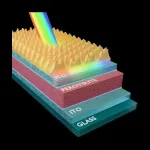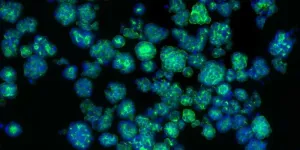(Press-News.org) SAN ANTONIO, Oct. 6, 2023 – Three decades after discoveries linking mutations in the BRCA1 gene to breast and ovarian cancer susceptibility, research led by Mays Cancer Center at The University of Texas Health Science Center at San Antonio (UT Health San Antonio) has pinpointed the molecular mechanism by which a large portion of these mutations cause cancers in women.
The discovery, unveiled in an Oct. 4 research article in the journal Molecular Cell, is poised to assist researchers in developing drugs to battle breast and ovarian cancers and to help identify women who are at an elevated risk of developing these cancers, according to the authors.
The article is titled, “Crucial Roles of the BRCA1-BARD1 E3 Ubiquitin Ligase Activity in Homology-Directed DNA Repair,” with lead author Weixing Zhao, PhD, assistant professor of biochemistry and structural biology, the Greehey Children’s Cancer Research Institute (GCCRI) and Mays Cancer Center at UT Health San Antonio.
Other corresponding authors include Sandeep Burma, PhD, professor and vice chair (research) of neurosurgery at UT Health San Antonio and Mays Cancer Center, and Rachel E. Klevit, PhD, professor of biochemistry at the University of Washington. Additional researchers are from GCCRI and the departments of biochemistry and structural biology, neurosurgery, obstetrics and gynecology, and molecular medicine at UT Health San Antonio; University of Washington; Dartmouth College; Colorado State University; and The University of Texas Southwestern Medical Center.
While it’s established that BRCA1 (Breast Cancer Gene 1) in conjunction with an essential partner gene BARD1 (BRCA1 Associated Ring Domain 1) act as a safeguard against cancer, how exactly it accomplishes this has been a matter of debate. One vital function of BRCA1, known as E3 ligase activity that was first reported in 1999, has been particularly spotlighted.
This activity allows BRCA1 to regulate key proteins involved in DNA repair and other biological processes by tagging these proteins with “ubiquitin moieties,” which refer to tiny molecular tags that can be attached to proteins inside our living cells. These tags are like little flags that signal different actions for those proteins.
However, in 2011, researchers using a specially designed variant of the BRCA1 gene (I26A), which was thought to lack the E3 ligase activity, concluded that this activity wasn't necessary for BRCA1's ability to prevent cancer. This conclusion remained at odds with the fact that a large number of BRCA1 mutations seen in patients actually fall within the E3 ligase domain of BRCA1.
“That work and many subsequent studies using the same mutant have shaped the field and its research for more than a decade, with more than 200 papers published using the BRCA1-I26A mutant,” Zhao said. “However, critical validation showing that the mutant is indeed ‘ligase-dead’ in a physiological context has never been reported.”
So, the team set about generating highly purified full-length BRCA1-BARD1 and several of its known cellular substrates that allowed them to establish robust BRCA1-BARD1-mediated in vitro ubiquitylation reactions. “This essentially not only allowed us to finally put underlying assumptions that had gone unquestioned for decades to the test,” Zhao said, “but we also sifted through a bunch of mutations to find the one that really shuts down the E3 ligase activity."
Using this approach, the researchers found that the mutant that was used in previous studies and believed to lack E3 ligase activity actually retains a strong level of this activity, challenging the longstanding belief that this activity of BRCA1 is not required for suppressing tumor formation. Furthermore, by finding a truly inactive mutant, they re-examined whether and how this activity is involved in DNA repair and tumor suppression.
“With this specific non-working mutant, our experiments clearly demonstrated that this enzyme is crucial in several stages of DNA repair," Zhao said. "Additionally, we found that the process of BRCA1-BARD1 adding ubiquitin to histones plays an important role in repairing DNA breaks, further strengthening our conclusion about this E3 ligase activity of BRCA1.”
Burma added, “Our findings necessitate reinterpretation of scores of previous studies involving the BRCA1-I26A mutant and provide us with a fresh perspective on the tumor-suppressor roles of BRCA1.”
Crucial Roles of the BRCA1-BARD1 E3 Ubiquitin Ligase Activity in Homology-Directed DNA Repair
Meiling Wang, Wenjing Li, Nozomi Tomimatsu, Corey H. Yu, Jae-Hoon Ji, Salvador Alejo, Samuel R. Witus, Dauren Alimbetov, O’Taveon Fitzgerald, Bo Wu, Qijing Wang, Yuxin Huang, Yaqi Gan, Felix Dong, Youngbo Kwon, Gangadhara R. Sareddy, Tyler J. Curiel, Amyn A. Habib, Robert Hromas, Carolina dos Santos Passos, Tingting Yao, Dmitri N. Ivanov, Peter S. Brzovic, Sandeep Burma, Rachel E. Klevit, Weixing Zhao
First published: Oct. 4, 2023, Molecular Cell
Link to article: https://www.sciencedirect.com/science/article/pii/S1097276523007347?dgcid=coauthor
The University of Texas Health Science Center at San Antonio (UT Health San Antonio) is one of the country’s leading health science universities and is designated as a Hispanic-Serving Institution by the U.S. Department of Education. With missions of teaching, research, patient care and community engagement, its schools of medicine, nursing, dentistry, health professions, graduate biomedical sciences and public health have graduated more than 42,200 alumni who are leading change, advancing their fields and renewing hope for patients and their families throughout South Texas and the world. To learn about the many ways “We make lives better®,” visit UTHealthSA.org.
Stay connected with The University of Texas Health Science Center at San Antonio on Facebook, Twitter, LinkedIn, Instagram and YouTube.
The Mays Cancer Center at UT Health San Antonio is one of only four National Cancer Institute-designated Cancer Centers in Texas. The Mays Cancer Center provides leading-edge cancer care, propels innovative cancer research and educates the next generation of leaders to end cancer in South Texas. To learn more, visit https://cancer.uthscsa.edu.
Stay connected with the Mays Cancer Center on Facebook, Twitter, LinkedIn, Instagram and YouTube.
END
New research led by Mays Cancer Center reveals how mutations in BRCA1 affect cancer susceptibility in women
2023-10-06
ELSE PRESS RELEASES FROM THIS DATE:
How the war in Ukraine is challenging two academic disciplines
2023-10-06
Since the beginning of Russia’s invasion of Ukraine, two academic disciplines have come to fore: peace and conflict studies and East European studies. Experts from both fields represent important voices in the public discourse. A symposium entitled ‘War and Peace in Ukraine: Reflecting, Studying and Engaging Across Disciplines” will be held from 12 until 13 October 2023 at Bielefeld University. It brings together experts from both fields in order to discuss the relationship between them and challenges of participating in a highly ...
How do our brains tell us what went wrong?
2023-10-06
Whether improperly closing a door or shanking a kick in soccer, our brains tell us when we’ve made a mistake because these sounds differ from what we expect to hear. While it’s long been established that our neurons spot these errors, it has been unclear whether there are brain cells that have only one job—to signal when a sound is unexpected or “off.”
A team of New York University neuroscientists has now identified a class of neurons—what it calls “prediction-error neurons”—that are not responsive to sounds in general, ...
New pathways of Alzheimer's disease identified
2023-10-06
Dementia, which includes Alzheimer's disease, currently affects around 1.8 million people in Germany. The exact cause has not yet been clarified, but genetic factors play a significant role in the development of the disease. Most previous analyses aimed at the identification of novel Alzheimer's genes used, a "case-control design". "With this conventional and highly simplistic analysis strategy, a vast amount of clinical information is lost that can be valuable for elucidating new disease mechanisms," says Prof. Dr. Lars Bertram, head of the Lübeck Interdisciplinary Platform for Genome Analysis at the University ...
Consistent metabolism may prove costly for insects in saltier water
2023-10-06
Increased salinity usually spells trouble for freshwater insects like mayflies. A new study from North Carolina State University finds that the lack of metabolic responses to salinity may explain why some freshwater insects often struggle in higher salinity, while other freshwater invertebrates (like mollusks and crustaceans) thrive. Salinity in this case refers to the concentrations of all the salts in an aquatic environment, not just sodium.
“Freshwater habitats in general are getting saltier for a number of reasons, including road salt and ...
Clinical trials: two arms are better than one
2023-10-06
The German Institute for Quality and Efficiency in Health Care (IQWiG) has responded critically to a reflection paper by the European Medicines Agency (EMA) on the approval of new drugs based on single-arm studies. The EMA correctly points out that studies without a control arm are subject to bias and that, in general, it is hardly possible to estimate causal effects from them. However, it does not provide clear criteria for limiting drug approval based on such studies to extremely rare exceptional cases.
The FDA shows how to do it
There is also no recommendation on external controls - in contrast to guidance published ...
The efficient perovskite cells with a structured anti-reflective layer – another step towards commercialization on a wider scale
2023-10-06
Perovskite-based solar cells, widely considered as successors to the currently dominant silicon cells, due to their simple and cost-effective production process combined with their excellent performance, are now the subject of in-depth research. A team of scientists from the Fraunhofer Institute for Solar Energy ISE and the Faculty of Physics at the University of Warsaw presented perovskite photovoltaic cells with significantly improved optoelectronic properties in the journal Advanced Materials and Interfaces. Reducing optical losses in the ...
BU researcher awarded $3.7 million to study how endothelial cell health impacts disease
2023-10-06
(Boston)—Naomi Hamburg, MD, the Joseph A. Vita Professor of Medicine at Boston University Chobanian & Avedisian School of Medicine, has been awarded a five-year, $3.7 million grant from the National Heart, Lung and Blood Institute for her research study, “Endothelial Cell Health Across the Spectrum of Cardiometabolic Disease.”
Cardiometabolic diseases are a group of common but often preventable conditions including heart attack, stroke, diabetes, insulin resistance and non-alcoholic fatty liver disease. The escalating prevalence of cardiometabolic risk factors including obesity and type 2 diabetes mellitus (T2DM) ...
Autoimmune and autoinflammatory connective tissue disorders following COVID-19
2023-10-06
About The Study: COVID-19 was associated with a substantial risk for autoimmune and autoinflammatory connective tissue disorders in this retrospective cohort study, indicating that long-term management of patients with COVID-19 should include evaluation for such disorders.
Authors: Solam Lee, M.D., Ph.D., of Yonsei University Wonju College of Medicine in Wonju, Republic of Korea, is the corresponding author.
To access the embargoed study: Visit our For The Media website ...
Cancer research: Metabolite drives tumor development
2023-10-06
Cancer cells are chameleons. They completely change their metabolism to grow continuously. University of Basel scientists have discovered that high levels of the amino acid arginine drive metabolic reprogramming to promote tumor growth. This study suggests new avenues to improve liver cancer treatment.
The liver is a vital organ with many important functions in the body. It metabolizes nutrients, stores energy, regulates the blood sugar level and plays a crucial role in detoxifying and removing harmful components and drugs. Liver cancer is one of the world’s most lethal types of cancer. Conditions that cause liver cancer include obesity, excessive ...
Patterns in physician burnout
2023-10-06
About The Study: The findings of this survey study involving 1,373 physicians and three survey periods suggest that the physician burnout rate in the U.S. is increasing. This pattern represents a potential threat to the ability of the health care system to care for patients and needs urgent solutions.
Authors: Marcus V. Ortega, M.D., of Massachusetts General Hospital in Boston, is the corresponding author.
To access the embargoed study: Visit our For The Media website at this link https://media.jamanetwork.com/
(doi:10.1001/jamanetworkopen.2023.36745)
Editor’s Note: Please see the article for additional information, including ...


